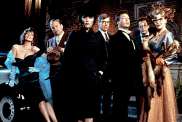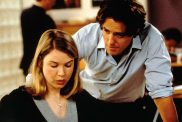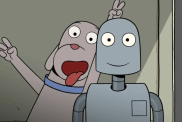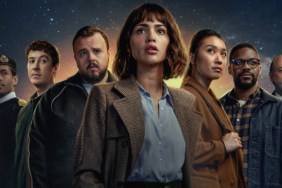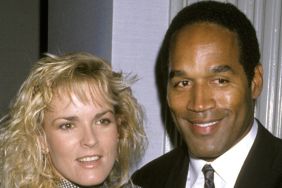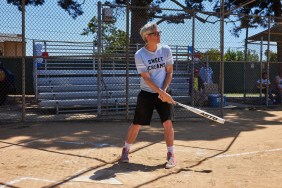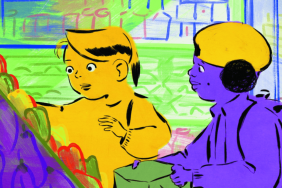Director Benson Lee talked to ComingSoon.net on the set of his new film Battle of the Year and tells us about his latest project:
Q: From the beginning, were you thinking, “I’ve got to make a feature film too?”
Benson Lee: Well, when I finished the documentary, I thought this could make a great dance feature, because I had seen all of them, in terms of the urban dance genre. I lived the drama of this event, which had pretty much like a Cinderella ending. I realized this would make for a great feature. After we premiered at the Tribeca Film Festival, a lot of producers came up to me and said, “We’d like to make this a features.” We went with Tripp Vinson and Beau Flynn from Contrafilm, they took it to Screen Gems, and that’s where we are today.
Q: Can we expect to see any of the same dancers from the documentary?
Lee: Absolutely. There are definitely some of the same dancers from the documentary in the feature.
Q: How did you go about choosing which dancers to have in the film?
Lee: It’s one thing to have a great dancer, but it’s another thing to find a great dancer who can act. At the same time, I have spent enough time with these guys to know they’re all charismatic. They’re kind of like singers, who transition into acting, I felt confident that the b-boys could do the same because when they dance and battle, they take on a certain persona. I felt they could be good actors as long as they played themselves. Our approach was to convince Screen Gems to use real b-boys because we couldn’t just hire actors who could do this kind of dance because it’s very challenging. Screen Gems said, “Yeah, let’s give it a try.” So we held auditions in New York and L.A., and we met a lot of b-boys and interviewed them. We heard their stories and saw what their screen presence was. That’s how we approached it and Screen Gems fell in love with a lot of the guys we auditioned. That’s how it kind of developed. We chose them because of their personalities because we wanted them to play themselves. After the script was done, we spent a lot of time in rehearsals so they had time to get comfortable playing themselves in front of the camera. Some of these guys had acted in other dance films, but they hadn’t really trained. They didn’t really have a lot of lines and when I watched them, I noticed they were a little awkward at times, a little too over the top. We didn’t want that. When they danced, they’re like Oscar-award winning performers in terms of their personas, but when they have lines it’s a little different. They completely over-exceeded our expectations as actors and they’re really feeling their characters right now. I’m extremely proud of their performances so far, in terms of the emotional levels they were able to attain, as actors. It was great. We were able to pull it off.
Q: Going back to the development process, was the idea of positioning this as a franchise ever discussed?
Lee: Not really, because it’s a little early to talk about it. It’s a good thing when you think about that, if the quality persuades you to feel that, it’s a good thing. Without jinxing the project, we’ve got a great story and we’re game for anything.
Q: Coming off Tribeca and having all those producers coming up to you, what was it about Contrafilm that made you go with them?
Lee: They definitely took the attitude that they wanted to try something different in terms of their approach to an urban dance film. There’s a certain format to it, with romantic interests and all that. The ballerina meets the street dancer, from different sides of the tracks… that’s been overdone and we didn’t want to do that. Neither did Contra and neither did Screen Gems.
Q: Was 3D always on the table?
Lee: No, it wasn’t, but then it made sense. We’re currently in the next generation of 3D, which is technically more proficient. It’s less concerned about the gimmicks and more concerned about including the audience into the world you create for them. That’s our approach with the 3D. We’re totally blown away by the stereography. I personally think we’re making the most beautiful movie ever made, not CGI, but live-action.
Q: Coming off a documentary into a 3D feature like this, was it more of a seamless transition than you thought it might be?
Lee: Not really. You go into it with a certain vision you want, and you just go with that. Actually, in the documentary, there’s a lot of similarities with feature film because you want the story to go in a certain direction and you seek that. Of course, you can’t really rely on that like you can in a scripted story, but, at the same time, you want the same drama. That was my first documentary and I came from a generation where they wanted to include more drama into documentaries, and give it more of a feature structure, if you will. It wasn’t that as shocking to me.
Q: Did the kids you chose ultimately inform the script in the way you told the story?
Lee: Yes, in a huge way. Another problem we had is, quite often, you have people with the best interests to make the best script, but sometimes the world is so different, and it’s hard to find a b-boy who’s a screenwriter. What Screen Gems was able to do was to be very generous with the story, in terms of going in there to capture the authenticity of the world, and then going in there to allow the b-boys to speak in their own voices. It helped them to invest in their characters more, so it was a really great process to get it to where it is now.
Q: So you started with a script then you incorporated more and more of their characters…
Lee: Yeah. They got the essence of the scene in there for the characters, and, throughout this whole production, they’re able to give their input and we’ve been able to use it. If it works, we use it, so it’s been an amazing collaboration in that aspect.
Q: You’re spoiling them for all their future projects.
Lee: Well, we’re hoping to change the tides for urban dance. We’d like for this to be the sort of standard because we’re done with the old theme and we feel there’s a lot of room. Dance has always been a great genre in film, but right now, in modern times, we want to provide modern characters with a good story. That’s been our M.O.
Q: There’s been a lot of talk about b-boys, but what about the b-girls?
Lee: There are b-girls in [the film]. There is a b-girl event there. I don’t know if there’s room for a Planet B-Girl or something, but they are in the film, for sure.
Q: What is your approach to music in the film? How do you see that coming together in post?
Lee: We have a phenomenal music supervisor Spring Aspers, and she really gets this world. We were able to bring on board b-boy music consultants because, like other dance genres, it’s very different, in terms of the music they use and the movements.
Q: What sort of music is it?
Lee: A lot of it is like what they call ‘the breaks.’ That’s why b-boy sometimes means ‘break-boy.’ When hip-hop started, a DJ would get two albums, and they would go back and forth and play that one part, the breakdown, over and over again, because people loved that breakdown. A lot of the music they danced to is upbeat, but has a certain kind of style. In my opinion, b-boys are the youngest people out there who listen to the oldest music, the best soul and funk. Their knowledge of music is really deep, so, quite often, you use a lot of the old classics. James Brown danced really fast, so his music complements that. In the canon of b-boy music, James Brown is one of the godfathers, for sure. Some of their stuff is really obscure, and it’s pretty funky.
Q: What’s your hope for what audiences will take away from this culture?
Lee: That they just know what a b-boy is, because a lot of people don’t. Another thing is they learn that this is a dance form and an art form and a sport. There is this whole sub-culture that exists. Chris Brown, who is not a B-boy, but trained with b-boys, he’s very respectful of b-boy culture and has trained really hard. He’s completely blown me away with his performance, not only as a dancer, but as an actor. Josh Holloway, who is one of the most generous actors I’ve ever met, his relationship with the b-boys are amazing. It’s on par with Olympic athletes, as far as how much they do, and how much they train. They just don’t get the same amount of respect or recognition.
Q: Is there going to be an original score created for this then?
Lee: Partly, yes. There’s going to be so much music required. Our composer is DJ Nu-Mark, who is one of the top indie hip-hop DJ’s in the world, and he’s super-respective of b-boy culture. People in the know, they really respect this culture a lot. What a lot of people don’t know is when hip-hop first started more people were break dancing around the world, than they were rapping. Rap, it’s a language thing, but when they see the dancing, they try it right away. Break dancing actually helped to spread hip-hop when it first came out.
Q: Even though it started here in America, do you think that b-boy culture is more respected and well-known elsewhere in the world?
Lee: It’s kind of like how hip-hop is all over the world, they know the origins are in America. It’s kind of like rock and roll too. It started here, and it evolved into people owning it in their own culture. We’ve clearly seen that with b-boying, but they’re clearly respective of the forefathers from the States. As we continue to evolve and go into the future, hip-hop is just going to be hip-hop. It’s not going to be an American thing. It’s going to be something that everybody owns.
Q: How important was bringing Chris Brown on? How did he come in?
Lee: I know that the studio needs a star-driven vehicle. I wasn’t familiar with his work as much, but I saw some of his dance clips and I was just blown away. He’s one of the greatest performers out there right now in terms of dance. He’s like a chameleon. He’s constantly taking on new dance forms and digesting it and producing it. There’s no one else I would want in this film right now than Chris Brown. As an actor he’s so natural and he gets along with the b-boys so well.
Q: What’s his character exactly?
Lee: He’s one of the main b-boys on the U.S. team. Once he got here, he was such a welcomed addition. He’s a huge star, but he’s so respectful to the b-boys and a consummate professional as an actor and dancer. He really takes a lot of pride in his work. To have that kind of energy on the set, was awesome.

